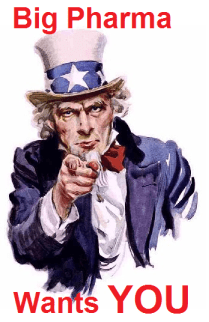6/10/2015
No one, other than Big Pharma employees probably, thinks the industry is entirely trustworthy. There are good reasons for that opinion, too. Big Pharma’s sneaky profit-boosting tactics only add to the list. Little surprise that the bottom line is more important to Big Pharma than actually helping customers.
Federal and state officials smacked the industry for a couple of these underhanded methods recently. Both of Big Pharma’s sneaky tricks involved delaying competition from generic versions of brand-name drugs. Generics hit the market once the patents on the brand name drugs expire and are much more affordable for consumers. Of course, this results in an undercutting of Big Pharma’s profits, which is completely unacceptable. After all, sick people aren’t important. Only profits matter.
I wrote about the first method, known as “forced switching” or “product hopping.” New York’s AG, Eric Schneiderman, scored a victory against Big Pharma via an injunction preventing Actavis from removing an older (i.e., patent is expiring) version of Namenda in favor of replacing it with a “new and improved” version that’s patent protected until 2029. The drug is used to treat Alzheimer’s disease and the change would force these patients, already facing difficult challenges, to purchase the more expensive option.
Schneiderman won the injunction largely because it was clear to the court that the only benefit the “forced switch” offered was to prevent profit loss for Actavis. The old drug had to be taken twice daily, while the new (expensive) drug was a once daily, extended release. The active ingredient in both drugs was identical. Actavis actively encouraged doctors to make the switch when writing prescriptions.
The second method is even more blatant: buy off the competition. Cephalon, maker of Provigil, a sleep disorder drug, did this in 2005-2006. It sued four generic competitors for patent infringement. When the competitors fought back, Cephalon shelled out over $300M the four companies so they would drop their own suits and stop selling generic Provigil for six year.
However, karma paid Cephalon and one of the generics, Teva Pharmaceutical Industries in Israel, a most entertaining visit. Teva, once bought off by Cephalon, turned around and bought Cephalon. One might think, “Serves Cephalon right for being so dirty” and one would be correct. Teva didn’t have entirely clean hands either, and karma is very observant.
The FTC took exception to Cephalon’s underhanded activities and decided to pursue the issue. Since Teva owns Cephalon, Teva gets to pony up the cash for Cephalon’s wrongs. Serves it right too, for allowing itself to be bought off in the first place. And pay it did, to the tune of a $1.2B settlement. That was the FTC’s largest settlement on record and is likely a lot less than Teva would have paid if the case went to trial. While it’s not exactly a head on a pike, it most definitely sends the same message to others in Big Pharma: we’re watching you and you’d better not try buying off your competition again.
One must wonder how many other diseases and conditions could be cured or at least helped if Big Pharma spent more time caring about people than it does profits. Alas, it doesn’t look like that enlightenment is going to happen anytime soon. Some diseases and conditions just aren’t profitable (Ebola, for example) and there’s definitely no money in healthy people.
Source:


Join the conversation!